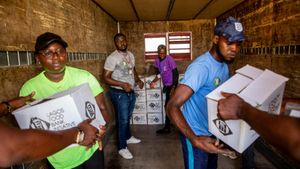Delayed cancer diagnoses can wreak havoc on patients' lives, transforming what could be manageable situations to harrowing battles. One such heartbreaking story involves Wioletta Smith, whose breast cancer went undiagnosed for ten long months simply because of a missed email. At 41 years old, she had been diligent about health check-ups, believing she was taking all necessary precautions to catch any issues early.
Wioletta had noticed changes in her right breast and sought the advice of doctors at Kingston Hospital just outside London. Her concerns were taken seriously; she attended her annual breast cancer examination, where results pointed toward something more serious. A radiologist marked her mammogram as requiring "further action," recommending follow-up testing including ultrasounds and potential biopsies. Unfortunately, the email containing her diagnostic results never reached the breast clinic.
This shocking oversight left Wioletta blissfully ignorant of her illness until she was compelled to return to her GP the following October after discovering more concerning lumps. This time, she was referred under the urgent two-week suspected cancer pathway, leading to the life-altering diagnosis of stage 3 breast cancer.
"I always made sure to attend all my appointments and reviews at the hospital, so when I didn’t hear back about the mammogram, I assumed everything was fine," Wioletta reflected. The news of her cancer diagnosis was devastating. "To find out less than a year later, I had cancer came as a huge shock; I was absolutely devastated," she explained.
A letter from Kingston Hospital Foundation Trust acknowledged the blunder, stating, "The result was not sent via the agreed process, so it wasn’t received by the breast clinic, and the recommendations weren't actioned." This supposed administrative slip-up has led to significant emotional turmoil and delay of treatment for Wioletta.
Despite undergoing surgery to remove the lump, alongside chemotherapy and radiotherapy, Wioletta is still grappling with the emotional fallout from her diagnosis. She has taken her experiences to heart, working with medical negligence lawyers at Irwin Mitchell to investigate her case and raise awareness of cancer symptoms and the importance of timely testing.
Wioletta isn’t alone; she’s part of the broader narrative surrounding delays in cancer treatment, where missed communications can lead to life-altering consequences. According to medical professionals, timely diagnosis and immediate action are key to improving survival rates for breast cancer, which remains the most common cancer among women. The NHS notes early detection significantly increases the chances of successful treatment.
Natural changes to breast tissue, along with visible signs like lumps or changes to the skin, should never be ignored. A proactive approach can include monthly self-exams to help notice any changes early on. Wioletta's experience serves as both a cautionary tale and a call to action, urging individuals to remain vigilant about their health even when they feel assured by prior check-ups.
Wioletta’s story echoes the sentiments of health advocates, stressing the necessity for regular screenings, particularly for those noticing changes. The crushing reality is, cancer can often present itself silently until it’s too late, which makes awareness and proactive healthcare all the more important. Her resolve to share her story is aimed at helping others pay attention to their bodies and seek prompt medical advice.
She stated, "I hope by speaking out, I can raise awareness of the symptoms of breast cancer. Many people are affected by the disease, so we all need to know what to look out for." Her advocacy not only highlights the personal toll of such delays but also reinforces the broader public health message surrounding cancer awareness.
Medical negligence cases like Wioletta's demand attention, calling for improvements across the NHS to prevent future oversights. Kingston Hospital has implemented changes to their notification systems to mitigate risks of similar errors. They have since restructured their radiological alert distributions to reduce human errors, emphasizing the hospital's commitment to patient safety.
While survivors like Wioletta focus on recovery and treatment, there is still much to be done to address systemic shortcomings. Individuals must remain engaged with their healthcare providers, ensuring communication channels remain open and inquiries are met with the urgency they deserve.
Wioletta's case is but one example of the unfortunate realities patients face within the healthcare system, yet her determination to advocate for herself and others shines through. Her story stands as both a warning and inspiration; care and attentiveness to health can lead to early detection, saving lives where administrative mishaps risk upending them.
Her plea for awareness serves as a steady reminder: never hesitate to follow through on health concerns and insist on clear communication with healthcare providers.
If you or someone you know is facing similar symptoms or concerns, never underestimate the importance of seeking advice and familiarizing yourself with the signs of breast cancer. Symptoms like lump formation, changes to breast texture, or unusual pain need immediate attention.
Wioletta's experience demonstrates the necessity of staying vigilant and proactive about health issues—certainly, every moment counts when it may be the difference between life and death.
Within the complex world of health care, solidifying patient trust is fundamental. Improvements to systems and processes, coupled with patient advocacy, are necessary steps toward fostering safer healthcare environments. Without such measures, the risk looms for countless others, caught by the same unfortunate fate of missed communications.
Wioletta’s battle is far from over, yet her unwavering spirit as she confronts her diagnosis pushes her to challenge the norm. The changes brought about by her struggles might just pave the way for other patients to receive the care they deserve, ensuring the lessons learned aren’t forgotten.



